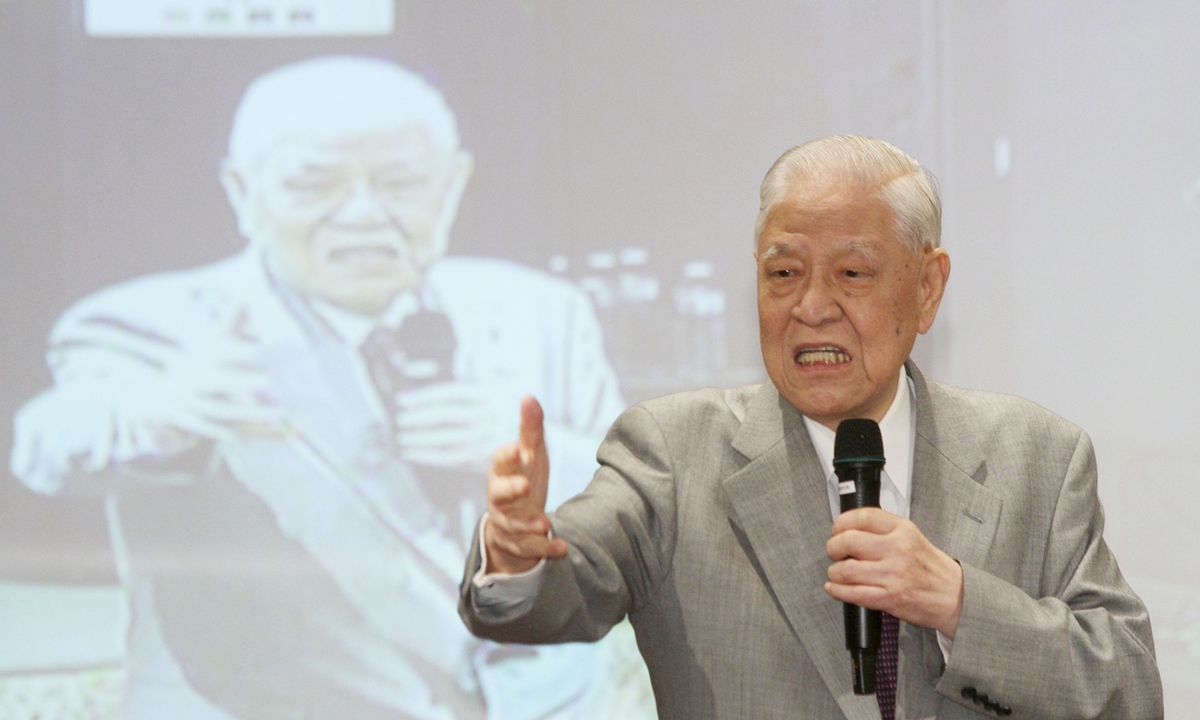‘Godfather of Taiwan secessionism’ dies at 97
By Yang Sheng, Zhao Yusha and Fan Lingzhi Source: Global Times Published: 2020/7/30 22:32:51
He had a chance to be a ‘great man, but eventually became a national sinner’

Former Taiwan regional leader Lee Teng-hui File photo: VCG
Former Taiwan leader, also known as the "Godfather of Taiwan secessionism," Lee Teng-hui, has died at the age of 97, a Taiwan hospital announced on Thursday.
Lee's death is definitely not a sad news to most people in the Chinese mainland as Taiwan pro-reunification politicians and mainland experts said he is "a traitor and a sinner of the Chinese nation."
Prior to the announcement, speculations of Lee's death were already circulating on Tuesday, fueled by media reports that Taiwan leader Tsai Ing-wen and her deputy Lai Ching-te had called off their original plans and visited Lee in hospital.
The Taipei Veterans General Hospital announced on Thursday that Lee had died at 7:24 pm. On Wednesday, Taiwan media reported that Lee's office ordered the hospital not to reveal Lee's condition, and the hospital also said it could not disclose patient's private details.
He was admitted to hospital in early February after choking while drinking a glass of milk, reports said. At the time, there were rumors that Lee had died, and that he had contracted the coronavirus, Taiwan media reported.
Lee, who took office in 1988 and retired in 2000, has long been decried as the "godfather of Taiwan secessionism" by mainland citizens and because of his flattering attitude toward Japan. Denying his Chinese identity was heavily criticized by Chinese on both sides of the Taiwan Straits.
Chinese mainland netizens also noticed the report. Some said, "What a shame, because we want him to be punished for his treason when we reunify the island." Others also criticized heavily that Lee "has forgot his own origin, and betrayed his ancestors."
Lee was a member of the pro-reunification Kuomintang (KMT), but later betrayed the KMT's principles to support localism and separatism. Even after leaving office, Lee was vocal about separating the island of Taiwan from the Chinese mainland.
"Lee had a chance to be a great man to promote reunification with the mainland, but he chose to be a 'strongman' in the island, as he wanted to be the founding father of Taiwan separatism, so he eventually ruined the KMT, the island, as well as the cross-Straits relations. He is a sinner of the Chinese nation," Yok Mu-ming, honorary president of the New Party of Taiwan, told the Global Times.
The New Party is a pro-reunification political party in Taiwan formed in 1993 out of a split from the then-ruling KMT, when Lee was the leader of the island and chairman of the KMT.
"He promoted me, so he was kind toward me, but I gave up the senior position he offered me at that time and I left him and the KMT. We have different beliefs so we walk on different roads, because I got edified by Chinese culture," said Yok, while Lee became deeply impacted by Japanese culture and ideas when he was young.
Lee and other extreme separatists of the island established a political group called the "Formosa Alliance" in 2018 to push for an "independence referendum" in Taiwan to continuously threaten the peace and stability of the Taiwan Straits.
Lee's separatist tendencies in the 1990s almost caused a military conflict between the mainland and the island, after he broke with the 1992 Consensus and the one-China principle to promote separatism for the island.
His flattering attitude toward Japan also received heavy criticism from Taiwan and the Chinese mainland, as he denied his identity as a Chinese and claimed he is Japanese, and even said China's Diaoyu Islands "belong to Japan," referring to them as the "Senkaku Islands" to please Japan.
The separatist Democratic Progressive Party (DPP) treats him with great respect to thank him for his support at the early stage. Otherwise, separatist sentiments would not have had an opening to be backed by a major party.
Lee was seen as a "sinner of the Chinese nation," Yang Lixian, a research fellow at the Beijing-based Research Center of Cross-Straits Relations, told the Global Times, noting that Lee was brainwashed by Japanese invaders when Japan occupied the island.
The Japanese rulers planted "the seed of secessionism" among the people in Taiwan to serve Japan's colonial rule before the end of World War II, as a sense of Chinese identity among the people would make it difficult for Japan to rule the island, Yang said.
Lee is a typical traitor of the Chinese nation, who hid among the KMT and cheated his leaders to gain power in the 1980s, the expert said.
As reunification of Taiwan becomes an irreversible trend for the island, separatists like Lee have begun to realize his previous goal of building a "state-to-state relationship" with the mainland has already gone up in smoke, Yang said.
Observers said the separatist DPP will surely honor Lee and commemorate him as a great leader, but no matter what the DPP does and says, his image as a national sinner will never be changed in the history of China, and the separatists of the island can never change the historic trend that Taiwan will eventually reunified with the mainland.